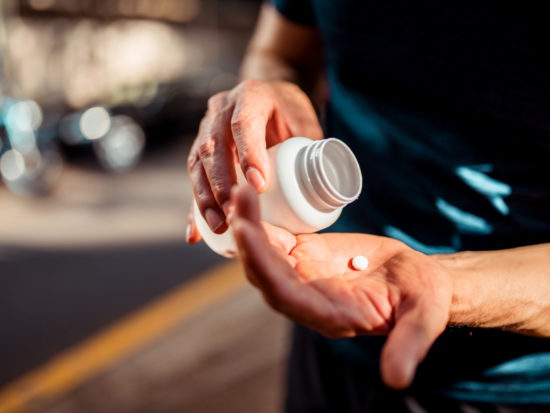Boost Your Digestion: You can do many things to support digestive well-being, from what you eat, when you eat it, and even the emotional state you eat it in. If bloating, gas, constipation, diarrhea, or digestive upset of any kind are a regular part of your life, explore these ten ways to support your body to improve digestion naturally.
![]()
This article has been medically reviewed by Dr. Charles Penick, MD![]()
1. Mindfulness

Mindfulness is simply being present with what is right in front of you. So often, we eat with next to no regard for the act of eating– opting to scroll through social media, watch TV, or work on the computer simultaneously. Yet, mindful eating has been associated with a wide range of digestion benefits, reduces ulcerative colitis and IBS symptoms, and manages type 2 Diabetes 1-2.
To eat mindfully, consider the following:
- Avoid any technology present during meal times
- Connect with your food with as many senses as you can: sight, smell, taste, touch (look at the plate, smell the food, notice the sensation and flavors of food in your mouth as you chew, things like temperature and texture as well)
- Put your fork down in between bites to encourage more chewing
- Socializing is fine; connecting with others over food typically enhances mindfulness and slower eating
2. Emotional State

The emotional state in which you eat your food plays an enormous role in how your body digests and assimilates it. When experiencing stress, the body often operates in a sympathetic-dominant state, known as fight or flight 3. During this state, non-essential processes like digestion and reproductive functions are impaired.
Eating when upset, angry, sad, or frustrated is not ideal for digestion. However, if you can work to resolve your emotional state before eating, it will encourage better digestion. In the short run, you may consider some breathwork, listening to your favorite song, or watching a funny comedy clip before eating to help ensure that you are emotionally uplifted and in a parasympathetic-dominant state that prioritizes rest and digestion.
In the long run, mitigating stress can include practices like yoga, meditation, therapy, and acupuncture, which may help reduce symptoms in severe digestive-related illnesses like IBS 4-5.
3. Hydration

Deep cellular hydration plays a crucial role in proper digestion 6. True hydration, however, requires more mindfulness than simply guzzling plain water. For water to properly hydrate the cell, it has to be accompanied by enough minerals like magnesium, potassium, and sodium 7.
At the very least, adding a pinch of high-quality, unrefined salt will help increase your body’s capacity to stay hydrated. Even better is to include a whole food vitamin C (like a squeeze of lemon or a natural vitamin C powder like camu camu) and a potassium source (like cream of tartar or coconut water).
Another fantastic way to get hydrating, mineral-rich water is to eat water-rich vegetables, especially fruit8.
4. Movement

A regular exercise routine plays a significant role in mitigating digestive upset. Exercise may reduce symptoms of IBS 9. Movement also positively affects the gut microbiome, which is essential in generating digestive well-being 10. In addition, activity increases blood flow and improves gut motility, which is crucial for those dealing with constipation 11.
It’s important to note that you probably want to avoid too much intense exercise before or after a meal. Training for digestive wellbeing is more of a lifestyle adaptation. What can help is a quick, very casual, post-meal stroll in the short run. In addition, gentle walking after a meal can help get things moving and help reduce your post-meal glucose spike 12.
5. Meal Size and Frequency

There is no universally true rule here since we all operate slightly differently. Some people feel better on more regular, smaller meals, while others thrive by restricting their eating window and having larger meals 13-14.
Finding out what works for you is key, and you may also consider occasionally switching it up since change breeds adaptation. Those more prone to constipation typically do better on smaller, consistent meals throughout the day 15.
6. Alcohol

The consumption of alcohol can interfere with the activity of the muscles surrounding the stomach and small intestine, reducing gut motility 16. Chronic consumption of alcohol can cause various digestive disruptions like reduced absorption of water, sodium, macronutrients, and micronutrients 16.
Some alcohols, like grappa, amaro, and sambuca, are considered ‘digestifs’ or post-dinner digestives. Ideally, opt for one that includes digestive bitters, which promote the digestive juices in your stomach 17. As always, it’s vital to tune in to your own body’s needs and see if less or more alcohol is what helps improve your digestion.
7. Consider a Supplement

You can support the digestive process in many ways, including enhancing digestion and strengthening the gut. Although digestion is a multifaceted process that can be impacted by many factors, like the ones listed above, some supplements that can help include:
- Digestive bitters: can be consumed before a meal to increase bile production to help you properly break down your food.
- Digestive enzymes: increase the enzymes present in your food to support the breakdown process of your food.
- Glutamine: promotes the health and function of the mucosal cells for routine healing and repair.
- Terrahydrite®: is a gut-strengthening, brain-boosting mineral supplement sourced from 60-million-year-old soil that naturally supports microbiome balance.
- Probiotics: help repopulate the gut with good bacteria.
Summary
The quality of your digestion is impacted by a wide range of factors, physical and emotional. Optimizing digestion can address some of these factors like; meal size and frequency, hydration, movement, and alcohol consumption.
You can also support digestion with mindfulness and consuming foods in the right emotional state. Supplements like bitters, enzymes, glutamine, Terrahydrite, and probiotics can also help promote digestive and overall gut health.
Medical Disclaimer: information on this website is not intended to replace a one-on-one relationship with a qualified health care professional and is not intended as medical advice. It is intended to share knowledge and information. This article has been medically reviewed by Dr. Charles Penick, MD, for the accuracy of the information provided, but we encourage you to make your own healthcare decisions based upon your research and in partnership with a qualified healthcare professional.
References
- Kristeller, Jean L, and Kevin D Jordan. “Mindful Eating: Connecting With the Wise Self, the Spiritual Self.” Frontiers in psychology vol. 9 1271. 14 Aug. 2018, doi:10.3389/fpsyg.2018.01271
- Miller, Carla K et al. “Comparative effectiveness of a mindful eating intervention to a diabetes self-management intervention among adults with type 2 diabetes: a pilot study.” Journal of the Academy of Nutrition and Dietetics vol. 112,11 (2012): 1835-42. doi:10.1016/j.jand.2012.07.036
- “Stress and the Sensitive Gut – Harvard Health Publishing.” Harvard Health, 21 Aug. 2019, https://www.health.harvard.edu/newsletter_article/stress-and-the-sensitive-gut.
- Mudyanadzo, Tatenda A et al. “Irritable Bowel Syndrome and Depression: A Shared Pathogenesis.” Cureus vol. 10,8 e3178. 21 Aug. 2018, doi:10.7759/cureus.3178
- Ma, Xiao et al. “The Effect of Diaphragmatic Breathing on Attention, Negative Affect, and Stress in Healthy Adults.” Frontiers in psychology vol. 8 874. 6 Jun. 2017, doi:10.3389/fpsyg.2017.00874
- Popkin, Barry M et al. “Water, hydration, and health.” Nutrition reviews vol. 68,8 (2010): 439-58. doi:10.1111/j.1753-4887.2010.00304.x
- “Electrolytes: Medlineplus Medical Encyclopedia.” MedlinePlus, U.S. National Library of Medicine, https://medlineplus.gov/ency/article/002350.htm.
- “Fruit and Vegetables.” Fruit and Vegetables – Better Health Channel, https://www.betterhealth.vic.gov.au/health/healthyliving/fruit-and-vegetables.
- Bilski, Jan et al. “The role of physical exercise in inflammatory bowel disease.” BioMed research international vol. 2014 (2014): 429031. doi:10.1155/2014/429031
- Monda, Vincenzo, et al. “Exercise Modifies the Gut Microbiota with Positive Health Effects.” Oxidative Medicine and Cellular Longevity, vol. 2017, 2017, pp. 1–8., https://doi.org/10.1155/2017/3831972.
- Oettlé, G J. “Effect of moderate exercise on bowel habit.” Gut vol. 32,8 (1991): 941-4. doi:10.1136/gut.32.8.941
- Reynolds, Andrew N, and Bernard J Venn. “The Timing of Activity after Eating Affects the Glycaemic Response of Healthy Adults: A Randomised Controlled Trial.” Nutrients vol. 10,11 1743. 13 Nov. 2018, doi:10.3390/nu10111743
- Cignarella, Francesca et al. “Intermittent Fasting Confers Protection in CNS Autoimmunity by Altering the Gut Microbiota.” Cell metabolism vol. 27,6 (2018): 1222-1235.e6. doi:10.1016/j.cmet.2018.05.006
- Catterson, James H et al. “Short-Term, Intermittent Fasting Induces Long-Lasting Gut Health and TOR-Independent Lifespan Extension.” Current biology : CB vol. 28,11 (2018): 1714-1724.e4. doi:10.1016/j.cub.2018.04.015
- Yang, Xiao-Jiao et al. “Epidemiological study: Correlation between diet habits and constipation among elderly in Beijing region.” World journal of gastroenterology vol. 22,39 (2016): 8806-8811. doi:10.3748/wjg.v22.i39.8806
- Bodhe, Christiane. “Alcohol’s Role in Gastrointestinal Tract Disorders .” ALCOHOL HEALTH & RESEARCH WORLD, vol. 21, no. 1, 1997, pp. 76–83., https://doi.org/https://pubs.niaaa.nih.gov/publications/arh21-1/76.pdf.
- Person. “Digestifs: What They Are, How They Work, and How They Are Enjoyed.” VinePair, 1 June 2021, https://vinepair.com/articles/digestifs-explained/.


